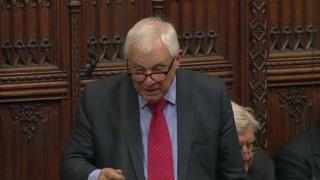
Lord Patten was among two dozen Conservative peers to defy the party whip
Peers have defeated the government on the issue of the UK staying in a customs union after Brexit.
The House of Lords voted by 348 to 225 in favour of a plan requiring ministers to report on steps to negotiate a continued EU-UK customs union.
Backing it, ex-EU Commissioner Lord Patten said the UK would be worse off unless current arrangements continued.
Ministers said they were “disappointed” but would not be derailed from their “very clear” commitment to leave.
The Department for Exiting the EU said Wednesday’s vote, which came as the Lords began detailed scrutiny of the government’s EU Withdrawal Bill, would not change that.
The defeat is the first of several expected as the House of Lords – in which the government does not have a majority – debates the government’s flagship EU bill in detail.
A total of 24 Conservatives voted against the government, including former ministers Lord Heseltine, Lord Lansley and Lord Willetts.
Before the vote, former Tory minister Lord Forsyth warned that peers were “playing with fire” with what he suggested were efforts to “overturn the wishes” of the British public, who voted to leave the EU in 2016.
- Campaigners demand ‘people’s’ Brexit vote
- Barnier: UK can change mind on single market
- Brexit bill fundamentally flawed, say peers
- Brexit: All you need to know
The amendment commits the government to report to Parliament “outlining the steps” it has taken, to secure “an arrangement which enables the UK to continue participating in a customs union with the European Union”.
Lord Patten said the UK could not replicate the benefits of the current customs union outside it as the UK’s exports to the EU were vastly bigger than those to the US, the Commonwealth and countries such as China.
Serving notice that he would be a serial rebel during the bill’s passage, the former EU commissioner said: “There are times in one’s political career where what is alleged to be party loyalty comes way behind trying to stand up for the national interest.”
Number 10 has ruled out remaining in the customs union, saying it would prevent the UK from signing third-party trade agreements with countries across the world.
‘Quasi-colonial’
Backing this stance, former Conservative Chancellor Lord Lawson said Lord Patten was putting forward a “political argument dressed up as a trade argument” and it amounted to a “wrecking amendment”.
Remaining in a customs union while leaving the EU would leave the UK in a “quasi-colonial” status, he said.
“I can see there are political reason for remaining in the EU, but I think the political reasons for leaving are much stronger. But what it is absolute nonsense to suggest is that there is an economic case for what is being proposed.”
The former chancellor said the financial arguments were “economic nonsense”
And Lord Forsyth went further, suggesting that it was a plot by “Remainers in this House, who are the majority, who refuse to accept the verdict of the British people – and I believe they are playing with fire”.
“I say to colleagues in this House, ”Have a care to what we are doing,'” he said. “We are an unelected house, and this amendment [is] part of a campaign which is putting peers against the people.”
Tory MP and Remain supporter Anna Soubry tweeted that the Lords had “put their country first” and called on her colleagues in the Commons to back them when the amendment returns.
Labour’s Chuka Umunna also praised the vote, saying it had given the House of Commons a “great opportunity” to discuss the impact of leaving the customs union.
But a statement from the Department for Exiting the EU said the fundamental purpose of the bill was to prepare the UK’s statute book for exit day, not about the terms of exit.
“This amendment does not commit the UK to remaining in a customs union with the EU, it requires us to make a statement in Parliament explaining the steps we’ve taken,” a spokesman said.
“Our policy on this subject is very clear. We are leaving the customs union and will establish a new and ambitious customs arrangement with the EU while forging new trade relationships with our partners around the world.”
The EU (Withdrawal) Bill will end the supremacy of EU law in the UK while ensuring existing laws passed since the UK’s entry in 1973 continue to apply.
Other potential flashpoints include amendments relating to Northern Ireland and a plan to scrap the government’s decision to fix Brexit for 23:00 GMT on 29 March, 2019.
A cross-party committee of peers warned in January that the bill was “fundamentally flawed” as it stood as much of its content hinged on the outcome of existing negotiations over the UK’s exit.
Brexit: Ministers suffer first defeat on EU Withdrawal Bill}

